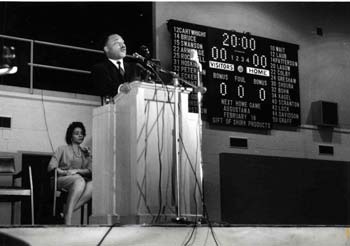Dr. Martin Luther King, Jr. Speech at Illinois Wesleyan University
Listen to the speech (audio courtesy of WJBC Radio)

President Bertholf and members of the faculty and members of the student body of this great institution of learning, ladies and gentlemen. I need not pause to say how very delighted and honored I am to have the privilege of coming once more to the campus of Illinois Wesleyan and the privilege of sharing with you in your lecture series. And I certainly want to express my appreciation to you for extending the invitation. I must apologize for being a little late getting here this evening, it so happened that we had a very important meeting in Chicago. And it was raining a little when we left Chicago and we were moving from the meeting where I had to speak, to get to the airport and my assistant, the Reverend Bernard Lee who is here, was driving us along and I noticed the car skipping around a bit in the midst of this rather slippery pavement. I had to say to Bernard to slow up a little bit. And I followed that up by saying that I would rather be Martin Luther King late than the late Martin Luther King.
But we are here and delighted to be here as your distinguished President has said, we are happy to be accompanied by Mrs. King, whom you have already met, and also by my dearest friend and close associate and perennial jail mate, the Reverend Dr. Ralph David Abernathy and his wife, to my left. You may stand.
"We have come a long, long way, but we have a long, long way to go before the problem is solved."
There is a desperate and innocent poignant question on the lips of hundreds and thousands, yea millions of people all over our nation and all over the world. I get it a great deal as I journey around the country and other places and I am sure this question is on the lips of many here tonight. It is the question, are we really making any progress in race relations? I think that there are basically three answers that can be given to this question. One is the answer of extreme optimism. Now the extreme optimist would say in substance that we are making marvelous strides in race relations. They would point joyously to the marvelous developments that have taken place over the last few decades in terms of legislative advances. And from this they would conclude that the problem is just about solved now and that we can sit down comfortably on the wayside and wait on the coming of the inevitable. The second position that can be taken is that of extreme pessimism. The extreme pessimist would say that we have made only minor strides in race relations. They would contend that the deep rumblings of discontent that we hear over the nation, the resurgence of the Klu Klux Klan in some sections of the South and other sections of the North, and the rebirth of white citizens councils, all indicative of the fact that we have created many more problems than we have solved. And from this they would go on to argue that there can really be no real progress in race relations. And it is very interesting to notice that the extreme optimist and the extreme pessimist agree on at least one point. And that is that we can sit down and do nothing in this all-important area. The extreme optimist says do nothing because integration is inevitable. The extreme pessimist says do nothing because integration is impossible. But there is a third position that can be taken, namely the realistic position. The realist in race relations trying to answer the question of progress would seek to combine the trues of two opposites, while avoiding the extremes of both. And so the realist would agree with the optimist that we have come a long, long way, but he would seek to balance that by agreeing with the pessimist in that we have a long, long way to go. And it is this realistic position that I would like to take as a basis for our thinking together this evening as we deal with the question of progress in race relations, and as we deal with the whole question of the future of integration. We have come a long, long way, but we have a long, long way to go before the problem is solved.